
INFORMATION SYSTEMS FRONTIERS
Scope & Guideline
Exploring Innovations at the Intersection of Technology and Theory
Introduction
Aims and Scopes
- Information Systems and Technology Integration:
The journal explores how information systems can be effectively integrated with various technologies, including AI, IoT, and blockchain, to enhance organizational performance and innovation. - Impact of Digital Transformation:
Research on the effects of digital transformation across different sectors, particularly how organizations adapt to new technologies and the resulting changes in processes, culture, and market dynamics. - Sustainability and Societal Impact:
A focus on how information systems can contribute to sustainability goals and address societal challenges, including health, education, and environmental issues. - User Interaction and Experience:
Investigating user behavior, engagement, and experience with information systems, including the design of user interfaces and the role of AI in enhancing user interactions. - Cybersecurity and Privacy:
Research addressing the challenges of cybersecurity, data privacy, and ethical considerations in the deployment of information systems. - Methodological Innovations:
The journal encourages the development and application of innovative research methodologies, including mixed-method approaches and advanced data analytics.
Trending and Emerging
- AI and Machine Learning Applications:
A significant increase in research exploring the applications of AI and machine learning across various domains, including healthcare, finance, and supply chain management, highlighting their transformative potential. - Digital Health Innovations:
Emerging research on digital health technologies, including telemedicine, health information systems, and AI in healthcare, reflecting the growing intersection of technology and health. - Sustainable Information Systems:
An increasing emphasis on sustainability within information systems, focusing on how technology can support sustainable practices and contribute to environmental goals. - Blockchain Technology:
Growing interest in blockchain applications beyond cryptocurrencies, particularly in areas such as supply chain management, e-governance, and data integrity. - User-Centric Design and Interaction:
Research is increasingly focusing on user-centric design principles and the role of user experience in the development of information systems, emphasizing the importance of engagement and usability. - Cybersecurity Innovations:
A rise in studies addressing innovative cybersecurity solutions, particularly in response to the increasing complexity of cyber threats in an interconnected world.
Declining or Waning
- Traditional IT Management:
Research focusing solely on traditional IT management practices has seen a decline as the field shifts towards more integrated and dynamic approaches involving emerging technologies. - Basic Data Analytics:
Basic data analytics studies are becoming less frequent as the field progresses towards advanced analytics, machine learning, and AI-driven approaches that offer deeper insights. - Conventional E-commerce Models:
Research on conventional e-commerce models is decreasing in favor of studies exploring new paradigms such as social commerce, mobile commerce, and the integration of AI in e-commerce strategies. - Static User Experience Studies:
There is a noticeable reduction in static studies of user experience, with a shift towards dynamic and context-aware user interaction research. - Generalized Cybersecurity Frameworks:
The focus on generalized cybersecurity frameworks is waning, giving way to more specific and context-driven studies addressing unique challenges in various sectors.
Similar Journals

Frontiers of Computer Science
Connecting Scholars to the Frontiers of Digital DiscoveryFrontiers of Computer Science is a leading peer-reviewed journal dedicated to advancing the field of computer science through the publication of high-quality research articles, reviews, and theoretical discussions. Published by HIGHER EDUCATION PRESS, this journal has gained significant recognition, currently boasting a prestigious impact factor and ranking in the Q1 quartile for both Computer Science (miscellaneous) and Theoretical Computer Science categories in 2023. With a focus on the intersection of computational theory and practical applications, it serves as a vital platform for researchers, professionals, and students alike who are eager to contribute to and stay updated with groundbreaking developments. The journal’s scope encompasses a wide range of topics, reflecting the diverse nature of computer science today. Operating from Beijing, China, it emphasizes Open Access, ensuring that vital research is readily available to the global academic community. With its convergence period spanning from 2013 to 2024, Frontiers of Computer Science remains committed to fostering innovation and scholarly dialogue that drives the future of technology.
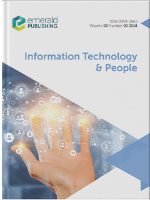
Information Technology & People
Transforming how we understand technology's impact on humanity.Information Technology & People is a renowned academic journal published by Emerald Group Publishing Ltd, dedicated to advancing insights in the intersection of technology, organizational context, and human behavior. Established in 1990, the journal has extensively contributed to the field of Computer Science Applications, Information Systems, and Library and Information Sciences, reflecting top-tier research as evidenced by its Q1 quartile ranking in 2023 across these categories. With a notable Scopus ranking, including a percentile of 91st in Library and Information Sciences, it serves as an essential resource for researchers, professionals, and students eager to explore contemporary issues and innovations in the deployment and impact of information technology on society. While not operating under an open access model, the journal provides a gateway to pivotal studies and findings that shape the future of IT and its implications for people and organizations. Located in the United Kingdom, Information Technology & People continues to be a vital platform for disseminating cutting-edge research that bridges the gap between technology and human experience.
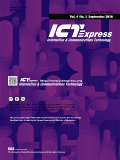
ICT Express
Pioneering Research in the Digital LandscapeICT Express is a leading open-access journal published by Elsevier that has established itself at the forefront of the fields of Artificial Intelligence, Computer Networks and Communications, Hardware and Architecture, Information Systems, and Software. Since its inception in 2015, this South Korea-based journal has provided a vital platform for disseminating innovative research and practical applications across these rapidly evolving domains. With an impressive impact factor and consistently high Scopus rankings—placing it in the top quartiles of its categories—it attracts contributions from both seasoned experts and emerging scholars. Current access options ensure that groundbreaking findings are readily available to a global audience, thus fostering collaboration and advancement in technology and computational sciences. As ICT continues to reshape various industries, the significance of research published in ICT Express is crucial for staying ahead in the digital landscape.
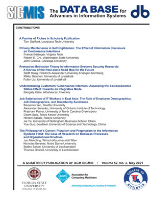
DATA BASE FOR ADVANCES IN INFORMATION SYSTEMS
Empowering Scholars with Cutting-edge InsightsDATA BASE FOR ADVANCES IN INFORMATION SYSTEMS, published by the Association for Computing Machinery, is a pivotal journal in the field of information systems, offering a platform for researchers and professionals to disseminate innovative findings and emerging trends. With its ISSN 0095-0033, this journal encompasses a broad spectrum of topics including data management, information retrieval, and systems architecture, making it a vital resource for scholars and practitioners keen on advancing knowledge in these areas. Although not an Open Access journal, it remains accessible through various academic institutions and libraries, maintaining its reputation as a cornerstone of scholarly communication. By fostering academic discourse, DATA BASE FOR ADVANCES IN INFORMATION SYSTEMS is committed to enhancing the quality and impact of research in the information systems domain, aiming to inspire the next generation of professionals and researchers.
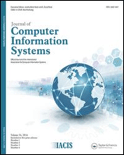
JOURNAL OF COMPUTER INFORMATION SYSTEMS
Pioneering Insights in Information Systems ResearchThe JOURNAL OF COMPUTER INFORMATION SYSTEMS, published by Taylor & Francis Inc, is a prestigious academic journal dedicated to the fields of computer science and information systems. With an ISSN of 0887-4417 and an E-ISSN of 2380-2057, this journal has been a valuable resource since its inception in 1995, contributing to the convergence of research until 2024. The journal holds significant status in its respective categories, achieving a Q2 ranking in Computer Networks and Communications, and a Q1 ranking in Education, demonstrating its impact and relevance to a broad academic audience. With Scopus rankings placing it in the 90th percentile for Social Sciences - Education and respectable standings in Computer Science, it serves as a critical forum for the dissemination of innovative research, methodologies, and case studies within the domains of computer information systems. Although not an open-access journal, it remains a highly cited source, attracting researchers, educators, and professionals seeking to enhance their knowledge and contribute to the evolving discourse in technology and education.
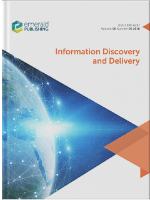
Information Discovery and Delivery
Connecting Researchers to Cutting-edge KnowledgeInformation Discovery and Delivery is a leading academic journal published by EMERALD GROUP PUBLISHING LTD, concentrating on the dynamic intersections of Computer Science and Library and Information Sciences. With an ISSN of 2398-6247, this esteemed journal has established its reputation by achieving a commendable Q2 ranking in both fields according to the latest quartiles, reflecting its commitment to advancing knowledge and practice in information discovery processes. With its Scopus ranking placing it in the 83rd percentile for Library and Information Sciences, and the 74th percentile for General Computer Science, the journal is recognized as an influential platform for researchers, professionals, and students alike. Its diverse and scholarly articles, spanning from its inception in 2017 through 2024, aim to explore innovative methodologies, technologies, and best practices that enhance information access and delivery systems. Although the journal is not Open Access, it remains an essential resource for those looking to delve into the latest findings and discussions shaping the landscape of information sciences. Join a community of thought leaders as we navigate the future of information discovery.
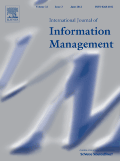
INTERNATIONAL JOURNAL OF INFORMATION MANAGEMENT
Empowering research excellence in information systems and beyond.International Journal of Information Management, published by Elsevier Science Ltd, is a premier journal dedicated to advancing the field of information management and its associated disciplines. With an impressive impact factor and categorized in the Q1 quartile across multiple domains such as Artificial Intelligence, Computer Networks and Communications, Information Systems, and Library and Information Sciences, this journal stands at the forefront of research excellence. Established in 1970 and running through to 2025, it serves as a vital platform for disseminating influential research and innovative ideas within these rapidly evolving fields. The journal's rigorous peer-review process ensures that only the highest quality research is published, thereby fostering academic discourse and collaboration among researchers, professionals, and students globally. Although it does not currently offer open access, the journal provides essential access options through institutional subscriptions, making groundbreaking research accessible to a broad audience. By continually adapting to the dynamic landscape of information management, the International Journal of Information Management reinforces its significance as a leading source of knowledge and insight for those dedicated to the advancement of science and practice in this vital sector.
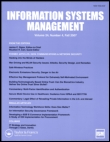
INFORMATION SYSTEMS MANAGEMENT
Exploring Innovations in Computer Science ApplicationsINFORMATION SYSTEMS MANAGEMENT is a premier academic journal published by Taylor & Francis Inc, focusing on the ever-evolving fields of Information Systems, Computer Science Applications, and Library and Information Sciences. With an impressive track record spanning over three decades since its inception in 1992, this journal is recognized in the top quartile (Q1) of its categories as of 2023, reflecting its influence and contribution to the research community. The journal holds commendable rankings in Scopus, positioned at #6 out of 280 in Library and Information Sciences, #44 out of 817 in Computer Science Applications, and #23 out of 394 in Information Systems, all showcasing its esteemed standing among peers. While the journal is not open access, it remains a vital resource for researchers, professionals, and students seeking to enhance their understanding of information systems management through high-quality, peer-reviewed articles that illuminate current trends, innovative technologies, and theoretical advancements in the field. With its dedicated commitment to scholarly excellence, INFORMATION SYSTEMS MANAGEMENT continues to be a leading platform for fostering knowledge dissemination and promoting academic dialogue.

EUROPEAN JOURNAL OF INFORMATION SYSTEMS
Exploring the Intersection of Theory and Practice in ITThe EUROPEAN JOURNAL OF INFORMATION SYSTEMS, published by Taylor & Francis Ltd, stands as a premier platform for groundbreaking research in the domains of Information Systems and Management. With an ISSN of 0960-085X and E-ISSN 1476-9344, this esteemed journal has been at the forefront of academic discourse since its inception in 1995, converging insights and innovative methodologies that reflect the dynamic landscape of information technology. Recognized for its excellence, the journal achieved a Q1 ranking across multiple categories in 2023, including Information Systems and Library & Information Sciences, underscoring its vital role in shaping contemporary research. Operating from the UK, the journal fosters an engaging scholarly community while offering researchers and practitioners insights that drive both theoretical advancement and practical application. Although it does not currently provide open access options, the journal's reputation for high-impact content makes it an essential resource for those who strive to advance the field. With an enduring commitment to quality, the EUROPEAN JOURNAL OF INFORMATION SYSTEMS continues to inform, inspire, and connect the next generation of scholars and professionals.

Human-centric Computing and Information Sciences
Empowering Innovation Through Human-Centric InsightsHuman-centric Computing and Information Sciences, published by the Korea Information Processing Society, represents a leading platform in the field of computer science, particularly focusing on the interaction between humans and computational systems. With an impressive Q1 ranking in the 2023 category of Computer Science (miscellaneous) and a commendable Scopus rank of #14/232 (94th percentile), this journal has established itself as a cornerstone for researchers and practitioners dedicated to advancing understanding in this vital area. Understanding the significance of making technology more accessible and effective for users, the journal has been an Open Access publication since 2011, promoting wide dissemination of knowledge without barriers. The journal's scope encompasses innovative methodologies, user experience design, and the integration of human factors into computing environments, making it essential reading for anyone interested in the intersection of technology and society. With all articles freely accessible, the journal not only contributes to scholarly discourse but also encourages collaboration among researchers worldwide, fostering further advancements in human-centric computing.